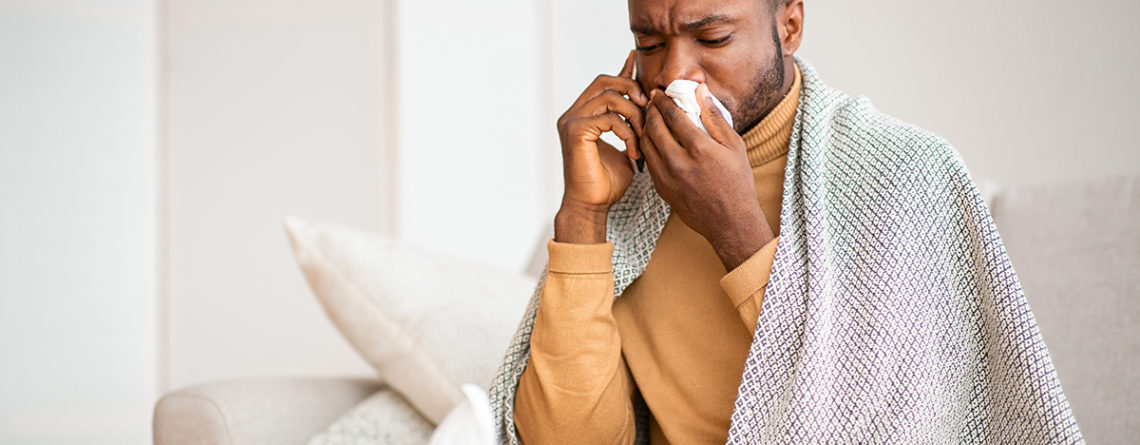Allergies vs. Coronavirus Symptoms: How to Tell the Difference
Now that the global spread of COVID-19 has started to overlap with spring allergy season, the sneezes, sniffles and coughs you usually have at this time of year might have become a more serious concern. How can you tell the difference between allergies vs. coronavirus symptoms, and when should you worry?
Recognize Your Symptoms
Allergies can make you feel like you’re coming down with something more severe. For example, congestion, sinus drainage and a runny nose can all indicate either a cold or allergies. However, if you catch a virus such as the flu or COVID-19, you will probably have a fever, body aches and extreme fatigue.
Though you might hear some people call spring allergies “hay fever,” allergy sufferers typically do not experience an increase in body temperature. If you take your temperature and it is higher than normal, you may be sick, not allergic. Conversely, people with allergies often have itchy eyes, nose, mouth and ears, but itching is not a symptom of COVID-19.
Though someone can contract coronavirus and remain asymptomatic, the most frequently experienced symptoms include a cough, high fever, sore throat and shortness of breath. Many people with COVID-19 have also reported losing their senses of smell and taste.
Allergies vs. Coronavirus: Can You Have Both?
It’s possible to have spring allergies and develop coronavirus at the same time. Allergy sufferers at this time of year should keep an eye on their symptoms and pay closer attention to how they feel. If you develop fatigue, weakness, body aches, a fever or a dry cough, call your doctor.
How to Manage Your Allergies
It’s normal for spring allergy symptoms to vary in severity from year to year, so if you feel worse this spring than you remember feeling in the past, don’t immediately assume you have COVID-19. If you’ve never experienced allergies before and have suddenly developed them, that’s also not necessarily cause for alarm. Your immune system can change throughout your life, so even if you didn’t have allergies as a child, you can start having them in adulthood.
These tips for staying healthy are especially useful this year because the COVID-19 outbreak has coincided with peak allergy season for many people.
- Cover your nose and mouth: If you feel a sneeze or cough coming on, grab a tissue or shield the lower half of your face with the crook of your elbow.
- Take over-the-counter allergy medicine: You can deal with some of your most severe allergy symptoms by consistently taking OTC nasal sprays or antihistamines. It’s crucial to be proactive and start taking these medicines before the onset of your worst symptoms.
- Pay attention to local pollen counts: Keeping an eye on the spikes of pollen counts where you live can help you figure out when you might experience an increase in your allergy problems.
- Stay home: To prevent the spread of COVID-19, health experts advise everyone to shelter in place, except when performing essential errands such as grocery shopping.
- Wear a mask: When you must go out in public places where social distancing is difficult to maintain, the CDC recommends wearing a cloth face mask. Having a mask – even a homemade one – can help slow the transmission of the virus, which spreads via airborne particles.
- Wash your hands: Practice thorough handwashing techniques, avoid touching your face and disinfect frequently touched surfaces around your home.
- Track the spread of coronavirus: Paying attention to the number of confirmed COVID-19 cases in your city and state can help keep you and your loved ones healthy and safe. As always, if you think you might be sick, call your general practitioner.
The Safest Place to Seek Addiction Treatment
Beach House is a private, secluded beachfront retreat located in beautiful Florida, in the small coastal community of Juno Beach. Our leadership team’s proactive response to the COVID-19 pandemic has ensured our campus is one of the cleanest and safest addiction treatment facilities in the nation. Substance abuse remains a nationwide health crisis, even in these unprecedented times, and we are dedicated to providing world-class care to those who need it. Contact us anytime for a confidential conversation with one of our admissions counselors.

